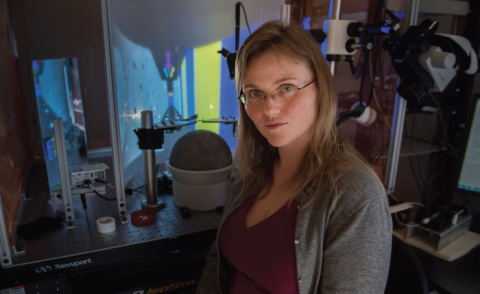
Annabelle Singer plans to develop, for the first time, a non-invasive way to drive neural activity with millisecond precision deep within the brain, while at the same time drafting the brain’s immune system to treat neurodegenerative diseases. And the National Institutes of Health (NIH) want to help her.
Singer, an assistant professor in the Wallace H. Coulter Department of Biomedical Engineering at Georgia Tech and Emory University, received a R01 grant from the NIH for her a grant proposal entitled, “Non-Invasive Methods to Drive Neural Activity with Millisecond Precision and to Recruit the Brain’s Immune Cells,” which will draw almost $2 million over five years from the NIH.
“This is really gratifying and it validates the work we’re doing,” says Singer, a researcher in the Petit Institute for Bioengineering and Bioscience at Tech. “The NIH doesn’t take big risks, so it shows that they believe we can execute on this project, and the grant lasts long enough for us to really make some headway.”
Singer’s lab recently discovered that flickering sound or a combination of lights and sound at gamma frequency drives neural activity in the deep brain structures, while also rallying microglia (the main form of immune defense in the central nervous system) to engulf pathogenic proteins in mouse models of Alzheimer’s disease.
The goal of the group’s R01 project is to develop sensory flicker as a non-invasive sensory tool that will translate to humans and spur new research with wide-ranging impact and therapies for multiple neurological diseases.
“This is important because current stimulation methods are invasive and usually don’t reach deep brain structures,” Singer says. “There’s been some work in this area, but there aren’t a lot of options – they’re not very fast, they don’t have millisecond precision. This novel approach would spur new possible therapeutic approaches to Alzheimer’s and other neurological diseases and galvanize new basic science research with wide-ranging impact.”
Jerry Grillo
Communications Officer II
Parker H. Petit Institute for
Bioengineering and Bioscience
